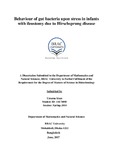Behaviour of gut bacteria upon stress in infants with ileostomy due to Hirschsprung disease
Abstract
Hirschsprung disease (HD) is a congenital one where the distal part of intestine lacks nerve ganglions, resulting in failure of defecation through anus. As treatment purpose, a stoma is created temporarily in the abdomen. Again, commensal gut bacteria play important roles for maintaining gut homeostasis and loss of harmony in these bacteria may lead to different diseases and may cause complications in already diseased individuals. Considering the stress level on gut bacteria in HD infants and the ability of commensals to endure strenuous conditions, in this study, we investigated the behavioural changes, if any, of the gut bacteria, specifically Lactobacillus spp. in HD infants.
Suspected Lactobacillus spp. were isolated from stool samples collected from stoma of HD infants and control Lactobacillus spp. were isolated from the stool samples of normal infants. After morphological evaluation and biochemical tests, the isolates were further confirmed by PCR with primers based on 16s rRNA. Representative isolates from both the groups were grown under different stress conditions, like pH (pH 2.5-8.5), NaCl (1%-10%) and bile (0.1%-0.3%). Also production of organic acids, antibiotic sensitivity and aggregation properties were checked. Effect of the isolates towards the growth of Escherichia coli and Vibrio cholerae were also evaluated using in vitro culture media and in vivo mouse model system.
Bacterial samples isolated from the stool of HD infant and normal infant survived under given stress conditions but optimal growth conditions varied. Again, the isolates from both infants produced acids during fermentations. Regarding antibiotic sensitivity, isolates from HD infant were found to be more prone to resistance. The auto-aggregation percentages were approximately within 70%-80% and co-aggregation percentages with other bacteria were found to be more for the normal one. Both in vitro and in vivo experiments demonstrated that the isolates from HD infant, were more capable of inhibiting the growth of E. coli and V. cholerae, when grown together. All these results indicate that, stress may cause dysbiosis of gut microbes and may lead towards different complications in HD babies.

